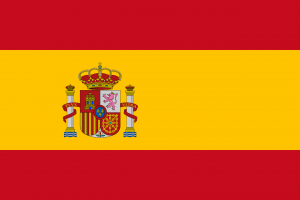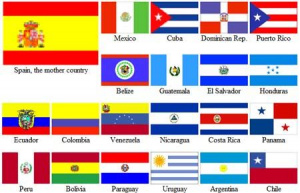Language/Spanish/Grammar/Future-Tense
Hi Spanish learners! 😊
In this lesson, we are going to learn about the future tense in Spanish. The future tense in Spanish is one of the simplest tenses to learn. If you know how to conjugate verbs in the present tense, then the future tense will be a piece of cake! The future tense is used to talk about actions that will happen in the future, and it is formed by adding certain endings to the infinitive form of the verb.
Finish this lesson and explore these related pages: El tiempo presente & Nouns and Gender.
Regular Verbs[edit | edit source]
The future tense in Spanish is formed using the infinitive form of the verb and adding the following endings:
| Person | Ending |
|---|---|
| Yo (I) | -é |
| Tú (You) | -ás |
| Él, Ella, Usted (He, She, You Formal) | -á |
| Nosotros/Nosotras (We) | -emos |
| Vosotros/Vosotras (You all informal) | -éis |
| Ellos, Ellas, Ustedes (They, You all formal) | -án |
As an example, let's conjugate the verb "hablar" (to speak) in the future tense:
| Person | Conjugation |
|---|---|
| Yo hablaré | I will speak |
| Tú hablarás | You will speak |
| Él/Ella/Usted hablará | He/She/You (formal) will speak |
| Nosotros/Nosotras hablaremos | We will speak |
| Vosotros/Vosotras hablaréis | You all (informal) will speak |
| Ellos/Ellas/Ustedes hablarán | They/You all (formal) will speak |
Now let's see some examples:
- Mañana hablaremos frente al público. (Tomorrow we'll speak in front of the public.)
- ¿Hablarás con tu jefe sobre el aumento de sueldo? (Will you talk to your boss about the salary increase?)
Irregular Verbs[edit | edit source]
As with all verbs, there are some irregularities that we need to be aware of. Below are some of the most common irregular verbs in the future tense:
- Tener (to have)
| Person | Conjugation |
|---|---|
| Yo tendré | I will have |
| Tú tendrás | You will have |
| Él/Ella/Usted tendrá | He/She/You (formal) will have |
| Nosotros/Nosotras tendremos | We will have |
| Vosotros/Vosotras tendréis | You all (informal) will have |
| Ellos/Ellas/Ustedes tendrán | They/You all (formal) will have |
- Poder (to be able to)
| Person | Conjugation |
|---|---|
| Yo podré | I will be able to |
| Tú podrás | You will be able to |
| Él/Ella/Usted podrá | He/She/You (formal) will be able to |
| Nosotros/Nosotras podremos | We will be able to |
| Vosotros/Vosotras podréis | You all (informal) will be able to |
| Ellos/Ellas/Ustedes podrán | They/You all (formal) will be able to |
- Querer (to want)
| Person | Conjugation |
|---|---|
| Yo querré | I will want |
| Tú querrás | You will want |
| Él/Ella/Usted querrá | He/She/You (formal) will want |
| Nosotros/Nosotras querremos | We will want |
| Vosotros/Vosotras querréis | You all (informal) will want |
| Ellos/Ellas/Ustedes querrán | They/You all (formal) will want |
Some examples:
- ¿Sabrás nadar mañana? (Will you know how to swim tomorrow?)
- Pedro no asistirá a la fiesta porque no podrá llegar a tiempo. (Pedro won't attend the party because he won't be able to arrive on time.)
- Mañana iremos al cine. ¿Quieres venir con nosotros? (Tomorrow we'll go to the movies. Do you want to come with us?)
The Verb "Ir"[edit | edit source]
The verb "ir" (to go) is often used to express the future tense in Spanish. To do so, we simply conjugate "ir" in the present tense, and then add the infinitive of the main verb.
Here's how to form the future tense with "ir":
| Person | Conjugation |
|---|---|
| Yo voy a hablar | I'm going to speak |
| Tú vas a hablar | You're going to speak |
| Él/Ella/Usted va a hablar | He/She/You (formal) is going to speak |
| Nosotros/Nosotras vamos a hablar | We're going to speak |
| Vosotros/Vosotras vais a hablar | You all (informal) are going to speak |
| Ellos/Ellas/Ustedes van a hablar | They/You all (formal) are going to speak |
Here are some examples:
- El año que viene voy a mudarme a Japón. (Next year I'm going to move to Japan.)
- Mañana vamos a visitar a mis abuelos. (Tomorrow we're going to visit my grandparents.)
Dialogues[edit | edit source]
- Person 1: ¿Qué vas a hacer este fin de semana? (What are you going to do this weekend?)
- Person 2: Voy a ir al parque con mi familia. ¿Tú qué vas a hacer? (I'm going to the park with my family. What about you?)
- Person 1: Pues, voy a ir al cine con mis amigos. (Well, I'm going to the movies with my friends.)
- Person 1: ¿Quieres venir conmigo al partido de fútbol el sábado? (Do you want to come with me to the soccer game on Saturday?)
- Person 2: Lo siento, no podré ir. Tengo cosas que hacer ese día. (I'm sorry, I won't be able to go. I have things to do that day.)
- Person 1: Oh, bueno. ¡Otra vez será! (Oh well. Maybe next time!)
Culture and Fun Facts[edit | edit source]
In some Spanish-speaking countries, the future tense can be used to express probability or conjecture about the present, rather than a future action. For example, if someone says "Estará enfermo" (he's probably sick), it means that the person is probably sick right now, not necessarily that he will be sick in the future.
A common future tense expression in Spain is "ir a las tuyas" (literally "go to yours"), which means going to someone's home for a party or social gathering.
Conclusion[edit | edit source]
In this lesson, we have learned the future tense in Spanish. Remember that it is formed by adding certain endings to the infinitive form of the verb. If you have any questions, please ask them in the comments section below.
➡ If you want to practice Spanish with native speakers, visit Polyglot Club. Don't be shy, find native speakers and ask them any questions!
➡ Feel free to edit this wiki page if you think it can be improved. 😎
Sources[edit | edit source]
- How do you form the future tense in Spanish? - Grammar
- How To Use The 3 Main Future Tenses In Spanish (Easy Guide)
- Future Tense Spanish: 3 Ways To Speak About The Future
Well done on mastering this lesson! Don't miss these related pages to expand your knowledge: The word that cannot be written & Interrogation signs.
Videos[edit | edit source]
Spanish Verbs in Future Tense - YouTube[edit | edit source]
FUTURE TENSE: How to conjugate verbs in Spanish - YouTube[edit | edit source]
TALKING about the FUTURE in SPANISH | Future tense Spanish ...[edit | edit source]
Regular, Future Tense Conjugation in Spanish (w/ Ser, Estar & Ir ...[edit | edit source]
Spanish Future Tense: The Easiest Way! - YouTube[edit | edit source]
Other Lessons[edit | edit source]
- Simple Past Tense
- El Verboide
- Plural
- How to conjugate in spanish
- Common Mistakes
- Conditional Mood
- Masculine and Feminine
- Present Progressive
- Use of verb Haber


